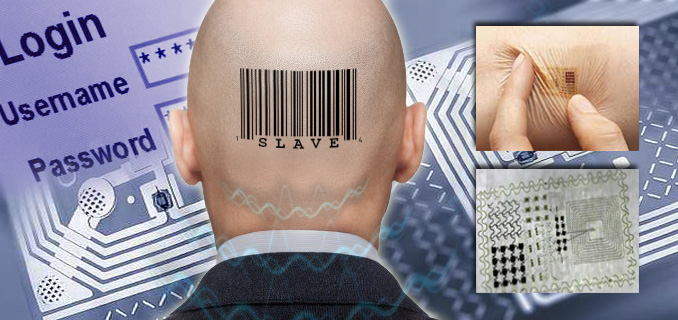Will Electronic Tattoos Replace Internet Passwords And All Other Forms Of Identification?
Source: blacklistednews.com

Would you wear an electronic tattoo if you couldn’t log on to the Internet without one?
That may sound crazy to many of you, but the technology for such a system already exists. RFID tattoos have existed for quite some time, and they are already being used on animals. But now an entirely new generation of electronic tattoos are being developed that can monitor your vital signs, interact with your mobile phone and even communicate directly with your mind. These new electronic tattoos are thinner than a human hair, and they are going to fundamentally transform the way that we think about human identification. Right now, the Internet is being absolutely plagued by hackers and identity theft has become a multi-billion dollar enterprise. It is becoming increasingly difficult to determine if someone is actually who they say that they are. And as even more of our commerce gets conducted through the Internet, identity security is going to be absolutely critical. Without a doubt, there will continue to be a push for more secure forms of identification than we have today. But there is also a very dark side to this kind of technology. What if someday a tyrannical government decides to make a permanent electronic tattoo for identification purposes mandatory for all citizens? What if you are not able to buy, sell, get a job, have a bank account or log on to the Internet without “proper identification”? What if the price for receiving your tattoo is to swear absolute allegiance to that tyrannical government? The truth is that technology is always a double-edged sword. It always brings with it the promise of progress, but it also always has a dark side that could potentially be abused.
The latest generation of electronic tattoos is quite remarkable. They are called “Biostamps”, and they were originally developed for medical purposes. However, as a recent Daily Mail article detailed, Motorola believes that these Biostamps could potentially replace passwords and make the Internet a much more secure place…
MC10 originally designed the tattoos, called Biostamps, to help medical teams measure the health of their patients either remotely, or without the need for large expensive machinery.
Motorola claims that the circuits, which also contain antennae and built-in sensors, could be adapted to work with mobile phones and tablets.
The mobile devices could then be used to confirm the owner’s identity and log them in to accounts automatically.
This would prevent thieves and other people from being able to access a phone, or individual apps on the device, if it is stolen or lost.
These Biostamps are extremely, extremely thin. As I mentioned above, they are actually thinner than a human hair. The following description of Biostamps was taken from a Wired Magazine article…
The development takes wearable technology to the extreme, designed as a non-invasive diagnostic sensor that could be used to measure hydration, activity, and even infant temperature. It bonds to the skin, somewhat like a temporary tattoo, flexing and bending in sync with your skin the way you wish a Band-Aid would. How? Researchers at the University of Illinois, Dalian University of Technology in China, and the University of California at San Diego made it really, really small.
With a thickness of 0.8 micrometers at the widest — around one-thousandth the diameter of a human hair — the thin mesh of silicon actually nestles in to the grooves and creases in your skin, even the ones too small to see. Being small helps, but it’s also important that the silicon is laid out in a serpentine pattern and bonded to a soft rubber substrate, allowing the stiff material to flex, a little bit like an accordion.
But why would such technology be needed on the Internet?
After all, don’t our passwords work just fine?
Actually, we are rapidly getting to the point where passwords are a joke. Hackers are becoming so sophisticated that they can crack even very long passwords with ease…
A team of hackers, commissioned by technology website Ars Technica, recently managed to crack more than 14,800 supposedly random passwords – from a list of 16,449 – as part of a hacking experiment.
The success rate for each hacker ranged from 62 percent to 90 percent, and the hacker who cracked 90 percent of hashed passwords did so in less than an hour using a computer cluster.
The hackers also managed to crack 16-character passwords including ‘qeadzcwrsfxv1331′.
Were you alarmed when you read that?
I know that I was.
Obviously we need a better system.
But personally I never plan to wear an electronic tattoo. That crosses the line in a big way.
Unfortunately, this kind of technology is going to be heavily pushed in the years ahead. According to Wired magazine, even the U.S. military is devoting resources to developing electronic tattoo technology.
[...]
Read the full article at: blacklistednews.com
Tune into Red Ice Radio:
Katie Deolloz & Andrea Hernandez - RFID Spy Chip Tracking in Schools
Kevin Warwick - "I, Cyborg": Implants, RFID, Microchips & Cybernetics
Nick Begich - Mind Control & Emerging Technologies
Kent Daniel Bentkowski - The Microchip Agenda
John Hall - Satellite Terrorism, Surveillance Technology, Implantable Microchips & Biometric ID Cards
Aaron Franz - The Philosophical Roots of Transhumanism
Rauni-Leena Luukanen-Kilde - Microchip Mind Control & Parapsychology
Dan Johnson - Hour 1 - People Against the National Defense Authorization Act
Charles Farrier - No CCTV, Campaign Against Big Brother Camera Surveillance






















